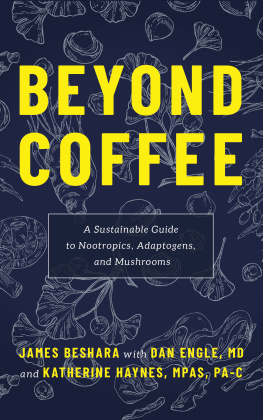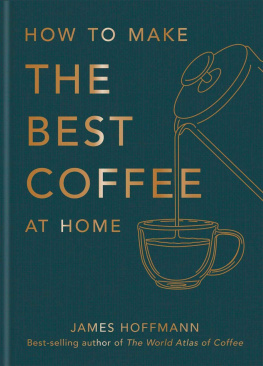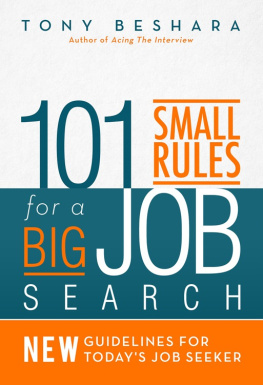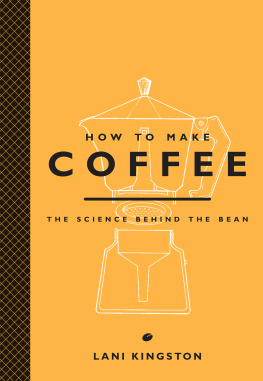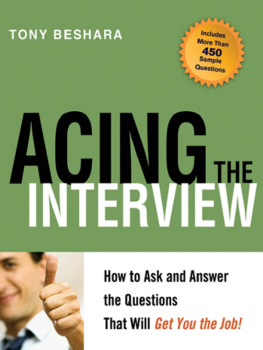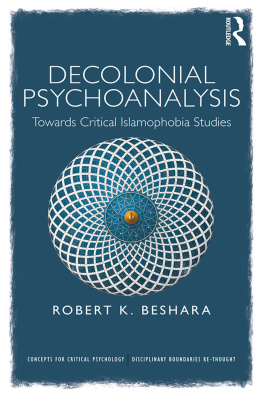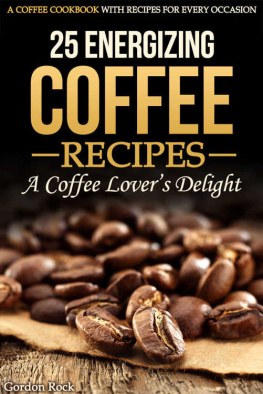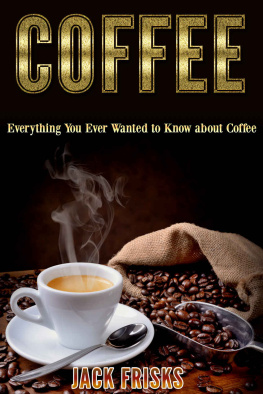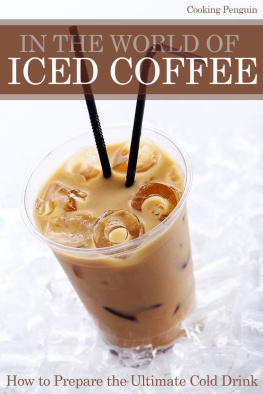James Beshara - Beyond Coffee
Here you can read online James Beshara - Beyond Coffee full text of the book (entire story) in english for free. Download pdf and epub, get meaning, cover and reviews about this ebook. year: 2019, publisher: BookBaby, genre: Romance novel. Description of the work, (preface) as well as reviews are available. Best literature library LitArk.com created for fans of good reading and offers a wide selection of genres:
Romance novel
Science fiction
Adventure
Detective
Science
History
Home and family
Prose
Art
Politics
Computer
Non-fiction
Religion
Business
Children
Humor
Choose a favorite category and find really read worthwhile books. Enjoy immersion in the world of imagination, feel the emotions of the characters or learn something new for yourself, make an fascinating discovery.
- Book:Beyond Coffee
- Author:
- Publisher:BookBaby
- Genre:
- Year:2019
- Rating:5 / 5
- Favourites:Add to favourites
- Your mark:
- 100
- 1
- 2
- 3
- 4
- 5
Beyond Coffee: summary, description and annotation
We offer to read an annotation, description, summary or preface (depends on what the author of the book "Beyond Coffee" wrote himself). If you haven't found the necessary information about the book — write in the comments, we will try to find it.
Beyond Coffee — read online for free the complete book (whole text) full work
Below is the text of the book, divided by pages. System saving the place of the last page read, allows you to conveniently read the book "Beyond Coffee" online for free, without having to search again every time where you left off. Put a bookmark, and you can go to the page where you finished reading at any time.
Font size:
Interval:
Bookmark:


Copyright 2019 James Beshara
All rights reserved.
ISBN: 978-1-5445-0546-6
The following book provides an overview of various nootropics, adaptogens, herbs, and mushrooms, highlighting their mechanism of action, potential benefits, side effects, and interactions with medications such as blood pressure medication or SSRIs. Many of these compounds have gone through rigorous testing and research, which is discussed here. However, side effects and interactions should be considered for each person on an individual basis. The information presented does not constitute medical advice or recommendations. Please consult your physician about taking any of these compounds, particularly if you have a chronic medical condition or take medications daily, to assure safety.
Visit beyondcoffeebook.com for more information including what the authors take on a daily basis to find their flow - state , interviews, and other resources. You can also use this link to share the first two chapters for free with others.
In todays technologically activated, ever - increasingly fast - paced digital age, whats the most common medically related focus goal across demographics and ages?
Hands down, its brain performance.
From Silicon Valley execs to undergraduate and postgraduate students, aging Baby Boomers, military veterans, and at - home digital startup parents, the number one desired area of health, performance, and optimization is the brain.
We are both fascinated and fearful of the future of our immensely magical human brains. On the one hand, gene jockeys promise longer lives. On the other, the epidemic of dementia en masse looms in the not - so - distant future. The brain and various approaches to improving cognition are like a neurological Pandoras box. Our brain has the potential to create symphonies of miraculous beautyas well as degenerate into a puddle of infantile dependency, often in the same lifetime. Thus, the Decade of the Brain has brought agents of cognitive performance into the limelight, specifically a novel class of acceleration tools called nootropics.
I first came into contact with a nootropic chemical jet fuel while in my medical training, through a medication that is a close cousin to Ritalin called Cylert. Just before medical school, I broke my neck in a diving accident and suffered my fifth major concussion. While in my psychiatry residency, I got turned upside down in a snowboard park and put a six - inch crack in my helmet, thus receiving my sixth one. These two concussions compounded in effect. I started having severe post - concussive syndrome and narcolepsy, a neurological condition where one gets sudden and uncontrollable sleep attacks. It was beyond miserable.
The only treatment at the time was prescription medication. A chemical rescue pill came into the pictureand it worked! How seductively it worked. Four years into the prescription and it was still working. Then I started experiencing some of its longer - term side effects, like migraine headaches, irritability, and mood swings. I also learned about the likely long - term neurotoxicity of stimulants like these. Plus, I had watched three out of four of my grandparents pass away with neurodegenerative conditions (two from Alzheimers dementia and one with Parkinsons disease); it was clear there was a need for an integrative, healthier, and more sustainable approach to neurological recovery and longevity.
Little did I know then that this experience would lead to a lifelong passion for exploring the psychiatric realms of cognitive science and regenerative methods, medicines, and technologies.
Ive written books on concussion recovery and have medically directed clinics focused on reparative neurobiology and transformational medicine. My medical and experiential background in this space has taught me a few simultaneously simple and profound things:
- We are each designed to express our unique brilliance.
- The brain is an infinitely complex, ever - evolving matrix of magic.
- Everything can be healed and optimized.
- Its up to each of us to do our due diligence to explore the available options, try them out for individual response, and use them responsibly.
Unbeknownst to me at the time, my brush with an unsustainable neurotoxin prescribed as medicine would color my research to not just look for results, but also to pay special attention to the sustainable approach to those results.
In this, the most dynamic time in human history, the human and natural collective needs each of us to be switched on to the best versions of ourselves, to who we are and what were here to do, for the long term.
In service to this vision, we offer this guide to support you along your journey of self - discovery and sustainable optimal performance. You have a unique genius to shine forth. Were excited to see it.
Dan Engle, MD
About five years ago, I was diagnosed with a heart conditionan irregular heartbeat termed atrial fibrillation. I was twenty - six years old. When the doctor told me the diagnosis, he asked me about my lifestyle, habits, stress, and exercise regimens. Then he asked how much caffeine I consumed each day. I told him that it was anywhere between five and six cups of coffee. He nodded, barely reacting, as if I had confirmed something in his mind. Then, in a somewhat unsurprised manner, he said that my caffeine consumption was likely the major contributor to developing a condition like atrial fibrillation this early in my life.
He said, James, with your condition, you really shouldnt consume more than 80 mg of caffeine a day.
Okay, how much is that in terms of coffee? I had no idea what I was about to agree to.
Well, at five to six cups, youre currently consuming about ten times that amount.
Despite the fact that I had just heard the news that I had a heart condition (one that I didnt know existed prior to that doctors visit, about which I didnt know the implications nor the severity), I remember being most overwhelmed by my doctors suggestion that I reduce my caffeine intake to about half a cup of coffee. At that time, I was running a company of 70 employees, and I couldnt imagine taking my energy crutch away. I remember seeing article after article touting how great coffee was for you. I thought about bringing those articles up to my doctor. Then I remembered he was my doctor, not some person who was casually deriding my bitter, black, productivity muse.
Conversationally, we only spent a few more moments on the topic, because there were larger things to discuss (like going to the ER for a cardioversion; fun!). But in our subsequent meetings, in which he continued to make the case for decreasing my caffeine intake, he mentioned green tea (specifically matcha green tea) as a great alternative to coffee. It contained less than 80 mg of caffeine and, he said, includes another compound called l - theanine that adds a calm focus in addition to the reaction of caffeineIt helps reduce the anxiety that coffee can give you as well.
I cant say it was game - changing at the time. But it did crack the door in my mind to an alternative to coffee. I was intrigued by the comment that another compound, when added to caffeine, could get me closer to what I was ultimately seeking in the first place: short - term and long - term productivity.
I took it for granted that coffee was the ambitious persons best friend. But five years and 40- plus iterations with different compounds later, I have learned about the different compounds from around the world that allow me to consume a fraction of the caffeine I used to, yet produce a multiple of the energy and productivity that coffee once delivered. These compounds include adaptogens, anti - inflammatories , herbs, mushrooms, and brain - focused supplements, sometimes called nootropics.
Font size:
Interval:
Bookmark:
Similar books «Beyond Coffee»
Look at similar books to Beyond Coffee. We have selected literature similar in name and meaning in the hope of providing readers with more options to find new, interesting, not yet read works.
Discussion, reviews of the book Beyond Coffee and just readers' own opinions. Leave your comments, write what you think about the work, its meaning or the main characters. Specify what exactly you liked and what you didn't like, and why you think so.

